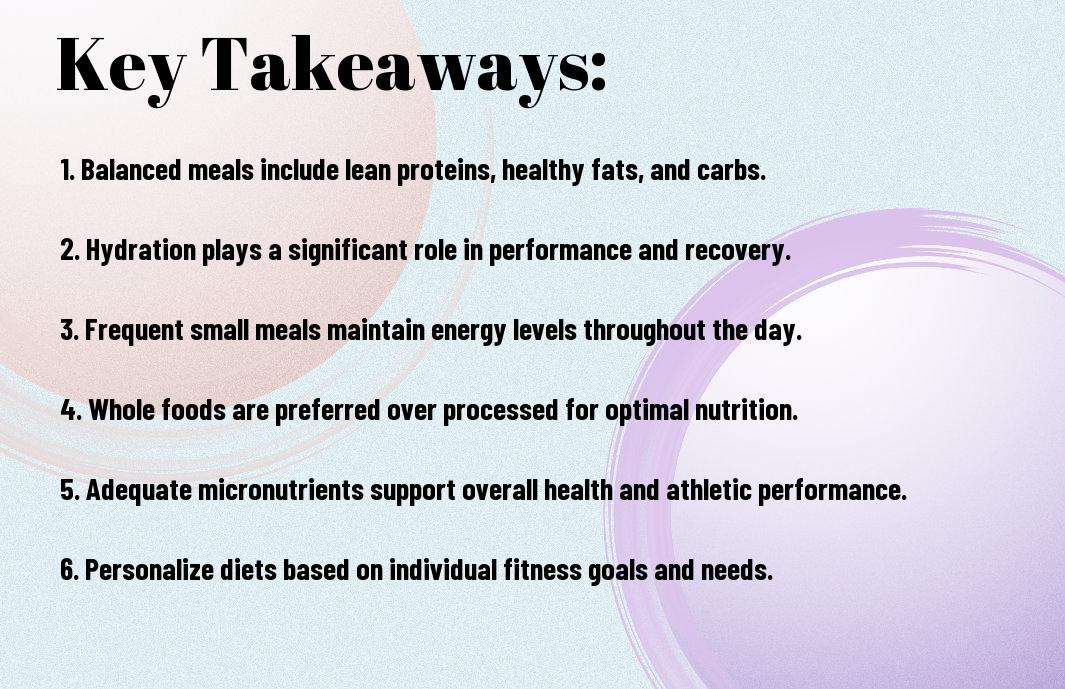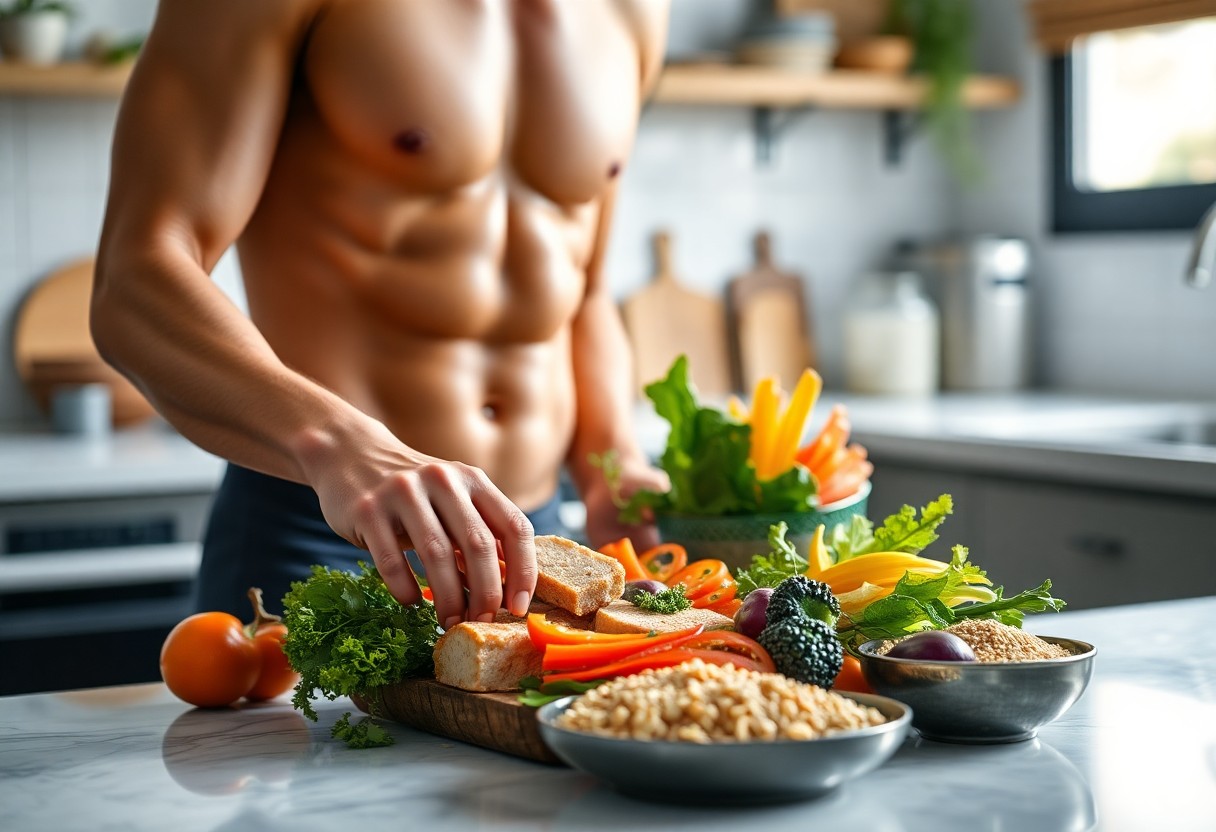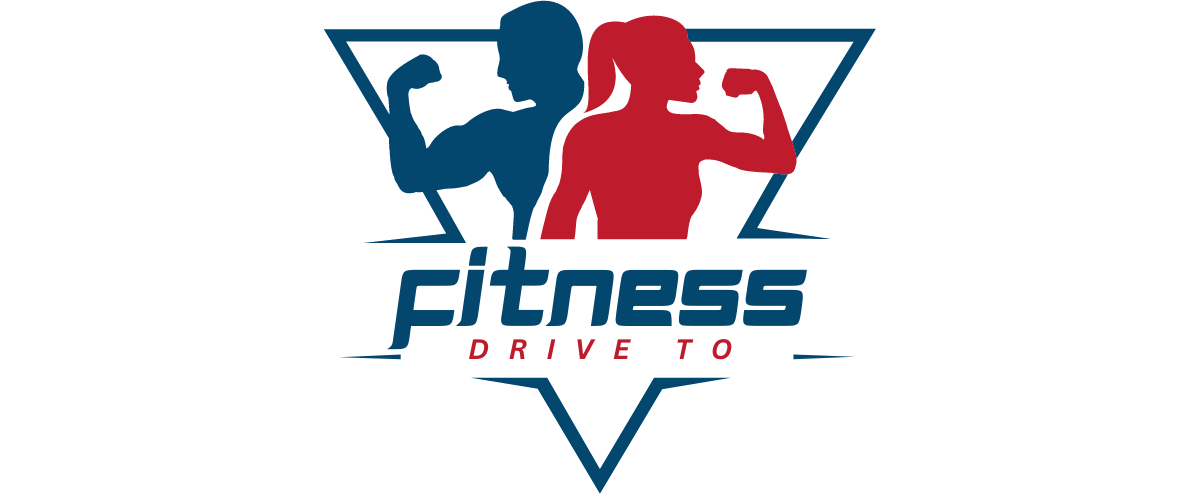There’s a wealth of knowledge in the diets of women fitness models that can elevate your own nutritional game. By adopting their strategically balanced meals and smart snacking habits, you can maximize your performance and improve your overall health. This blog post explores key foods these models prioritize, how they meet specific energy needs, and the timing of their meals to stay at the top of their game. Dive in to discover eating strategies that can transform your fitness journey.
Key Takeaways:
- Balanced Diet: Women fitness models prioritize a well-rounded diet that includes a variety of macronutrients such as proteins, carbohydrates, and healthy fats to support their energy needs.
- Meal Timing: Strategic meal timing is important; many fitness models consume smaller, frequent meals throughout the day to maintain energy levels and optimize metabolism.
- Hydration: Adequate hydration is emphasized, with models often consuming plenty of water and hydrating foods to enhance performance and recovery.
- Nutrient-Dense Foods: The focus is on nutrient-dense foods such as lean proteins, whole grains, and a variety of fruits and vegetables that provide imperative vitamins and minerals.
- Supplements: Many women fitness models consider supplements, like protein powders and vitamins, to fill any nutritional gaps and support their fitness goals.

Understanding Nutrition for Fitness Models
Your journey into the world of fitness modeling begins with a solid understanding of nutrition, which plays a pivotal role in achieving peak performance. Fitness models prioritize their dietary choices, balancing macronutrients and micronutrients to support their rigorous training schedules and overall health. By mastering the art of nutrition, you can enhance your physical capabilities and maintain a physique that meets your personal goals.
Macronutrients: The Building Blocks of Performance
To fuel your body effectively, it’s vital to understand macronutrients: carbohydrates, proteins, and fats. Each of these nutrients serves a unique purpose in your diet, from providing energy to aiding muscle recovery. By strategically balancing these macronutrients, you can optimize your performance and ensure that your body functions at its best.
Micronutrients: Essential Vitamins and Minerals
With a focus on macronutrients, don’t neglect the importance of micronutrients, which are important vitamins and minerals that support overall health. These nutrients are integral to your metabolic processes, immune function, and energy production. By including a rainbow of fruits and vegetables in your diet, you can ensure you are getting a wide array of micronutrients, which contributes positively to your fitness goals.
The incorporation of micronutrients into your diet is necessary for maintaining optimal health and performance. These vitamins and minerals support energy production, assist with muscle contraction, and boost your immune system. A deficiency can lead to fatigue, decreased performance, and increased risk of injury. Prioritize foods rich in vitamins A, C, D, and E, as well as important minerals like iron, calcium, and magnesium. By doing so, you’re not only enhancing your physical fitness but also safeguarding your overall well-being.
Daily Meal Plans of Fitness Models
While each fitness model may have a unique approach to their daily meals, a structured meal plan is key for optimizing performance and maintaining energy levels. These meal plans typically include balanced portions of macronutrients—proteins, healthy fats, and carbohydrates. Ensuring you consume meals at regular intervals throughout the day can help to sustain your metabolism and support your training goals.
Breakfast: Kickstarting Metabolism
One of the most important meals of the day, breakfast for fitness models is often packed with protein, fiber, and healthy fats to jumpstart metabolism. You might find options like scrambled eggs with spinach, a smoothie with protein powder, or oats topped with fresh fruits. These choices not only fuel your body but also help you stay satiated throughout the morning.
Lunch: Fueling the Midday Energy Dip
Any effective lunch should include a balance of nutrients that will sustain your energy levels and keep you focused. You might opt for lean proteins, like grilled chicken or turkey, combined with complex carbohydrates such as quinoa or sweet potatoes, along with a variety of colorful vegetables.
Kickstarting your afternoon with a nutritious lunch is vital for maintaining your energy and productivity. Pairing lean proteins with complex carbohydrates can prevent that dreaded midday slump, keeping your focus sharp and performance high. Don’t shy away from incorporating healthy fats, like avocado or nuts, to enhance satiety and provide a steady release of energy.
Dinner: Recovery and Rebuilding
Metabolism doesn’t stop when the sun goes down. Dinner for fitness models often consists of a balanced meal rich in proteins and nutrients to aid recovery. Options may include salmon with asparagus or a hearty vegetable stir-fry with tofu to replenish your body’s needs after an active day.
Models understand the importance of dinner for recovery and rebuilding muscle after a rigorous workout. Focus on incorporating high-quality protein sources while also indulging in a variety of colorful vegetables to maximize nutrient intake and support your body’s repair processes. This thoughtful approach helps you to not only recover faster but also to maintain a balanced approach to nutrition in your fitness journey.
Snack Strategies for Optimal Energy
Unlike traditional diets that limit snacking, maintaining optimal energy means embracing healthy snacks. Incorporate nutrient-dense options to keep your metabolism fired up and maintain focus throughout the day. Choosing the right snacks will not only sustain your energy levels but can also aid in recovery and performance during workouts, positioning you for success in your fitness journey.
Healthy Options On-the-Go
Snack on-the-go to prevent lethargy and keep hunger at bay. Brilliant choices include nuts, fruit, and protein bars. These portable snacks provide a perfect blend of healthy fats, carbohydrates, and protein to keep your energy levels stable while you tackle your busy lifestyle.
Timing Snacks for Peak Performance
Between meals, it’s vital to fuel your body effectively. Strategically timed snacks can optimize performance and enhance recovery. Consuming a small snack about 30 minutes before your workouts will provide a necessary energy boost, while refreshing your body 30-60 minutes after exercising accelerates muscle recovery. This well-timed approach helps maintain peak energy levels throughout your fitness routine.
Energy levels can fluctuate dramatically throughout the day, so it’s vital to approach snack timing wisely. By scheduling your snacks, you can prevent dips in energy that may hinder your workouts or daily tasks. Focus on snacks that are rich in carbohydrates and protein both pre- and post-workout to sustain your energy and support muscle recovery. Staying consistent with your snack intake not only enhances your performance but also boosts your overall well-being.
The Role of Hydration in Performance
Not only does proper hydration enhance physical performance, but it also supports cognitive function and mood stability during workouts. As a woman fitness model, you understand that even mild dehydration can lead to decreased strength, endurance, and concentration, hampering your peak performance. Prioritizing your hydration routine is important for maintaining optimal health and achieving your fitness goals.
Importance of Water Intake
Among the many factors influencing your fitness, adequate water intake plays a pivotal role. Staying properly hydrated ensures your body can efficiently regulate temperature, transport nutrients, and remove waste. Your muscles function better and recover faster when you are consistently drinking water throughout the day.
Pre- and Post-Workout Hydration Tips
To maximize your performance, follow these hydration tips before and after your workouts:
- Drink at least 16-20 ounces of water 2-3 hours before exercising.
- Replenish with 8 ounces of water 20-30 minutes prior to your workout.
- Post-exercise, consume 16-24 ounces of water for every pound lost during your session.
Recognizing the importance of systematic hydration can greatly impact your results.
The tips provided above ensure that you align your hydration strategy with your fitness routine. Prioritize your water intake throughout the day and pay attention to how your body feels. Consider incorporating electrolyte-rich drinks if your workouts are particularly intense or lengthy. Also, remember that thirst is not the only indicator of hydration status—monitor urine color to determine if you are adequately hydrated. Recognizing these aspects will enhance your overall wellness and fitness journey.
- Monitor urine color for hydration status.
- Incorporate electrolyte drinks during intense workouts.
- Drink water consistently, not just when you feel thirsty.
Recognizing the signs of dehydration can keep your performance at its peak.
Supplements: What’s Worth Considering?
To maximize your performance and recovery, choosing the right supplements can be beneficial. Women fitness models often turn to certain products to support their rigorous training regimens. Though not a substitute for a balanced diet, specific supplements may enhance your results and improve overall health when used wisely. Always consider your individual needs and consult with a healthcare professional before starting any supplement regimen.
Common Supplements for Fitness Models
The most frequently used supplements among fitness models include protein powders, BCAAs, omega-3 fatty acids, and multivitamins. Protein powders help meet daily protein requirements, while BCAAs support muscle recovery and reduce soreness. Omega-3s promote joint health and reduce inflammation, and a good multivitamin ensures you’re not missing imperative nutrients.
Evaluating Your Nutritional Needs
Any effective supplement strategy begins with a thorough assessment of your unique nutritional needs. Consider factors such as your activity level, dietary restrictions, and specific fitness goals when determining what to take.
And as you evaluate your nutritional needs, keep in mind that individual requirements vary. Assess your diet to ensure you’re receiving sufficient macronutrients and micronutrients before resorting to supplements. Consulting with a registered dietitian can help identify any gaps in your nutrition. Focus on supplements that will enhance your performance and overall well-being while avoiding unnecessary or potentially harmful products. Always prioritize whole foods as your primary source of nutrients.

Meal Prep and Cooking Tips
Despite your busy schedule, meal prepping can be a game-changer for your nutrition goals. Incorporating these meal prep and cooking tips can help you stay on track:
- Plan your meals weekly.
- Invest in quality containers.
- Prep ingredients in bulk.
- Incorporate variety to avoid boredom.
The key is to establish a routine that suits your lifestyle.
Planning Ahead for Success
To maximize your meal prep efforts, develop a weekly plan that outlines your meals and snacks. Designate a specific day for grocery shopping and cooking, ensuring you have all the necessary nutrient-dense foods on hand. This strategy helps you make informed choices and reduces the temptation to indulge in less nutritious options.
Easy Recipes to Incorporate into Your Routine
Before you begin your meal prep, consider adding some easy recipes that fit seamlessly into your routine. Focus on dishes that are not only quick to prepare but also packed with necessary nutrients.
Success with meal prep hinges on creating easy, engaging recipes that align with your health goals. Try overnight oats for breakfast, quinoa salads for lunch, and stir-fried vegetables with lean protein for dinner—they’re nutritious and flavorful. Incorporating these meals into your week ensures you receive the vitamins and minerals your body craves, while also maintaining your energy and optimizing performance as you work toward your fitness goals.
To wrap up
Considering all points, understanding the nutrition strategies of women fitness models can significantly enhance your fitness journey and performance. By incorporating high-quality proteins, healthy fats, and nutrient-dense carbohydrates into your diet, you set yourself up for success in achieving your goals. Adjusting your meals based on your training intensity and personal needs is key to maintaining optimal energy levels. To dive deeper into structured plans, check out the 10 Days To Extreme Definition: The Pro Fitness Model’s Guide.
FAQ
Q: What types of foods do women fitness models typically include in their diets?
A: Women fitness models often prioritize whole, nutrient-dense foods in their diets. Common food choices include lean proteins such as chicken, turkey, fish, eggs, and plant-based proteins like beans and lentils. They also incorporate plenty of fruits and vegetables for vitamins and minerals, healthy fats from sources like avocados, nuts, seeds, and olive oil, and whole grains such as quinoa, brown rice, and oats for sustained energy. This balanced approach helps them support their fitness routines while maintaining overall health.
Q: How do women fitness models adjust their nutrition for different training phases?
A: Nutrition adjustments are often made based on the specific training phase a fitness model is in, whether it’s for bulking, cutting, or maintaining their physique. During a bulking phase, they may increase their caloric intake with additional healthy carbohydrates and proteins to support muscle growth. Conversely, in a cutting phase, they might reduce caloric intake while focusing on higher protein meals to maintain muscle mass and promote fat loss. The key is to tailor their macronutrient ratios and meal timing to align with their fitness goals and activities.
Q: What role do supplements play in the nutrition of women fitness models?
A: While whole foods should be the foundation of their nutrition, many women fitness models include supplements to complement their diets as needed. Common supplements may include protein powders for convenient protein intake, omega-3 fatty acids for heart health, multivitamins to ensure adequate micronutrient levels, and branched-chain amino acids (BCAAs) to support recovery. It’s important for individuals to evaluate their specific needs and consult with a nutritionist or healthcare professional before adding supplements to their routine.



